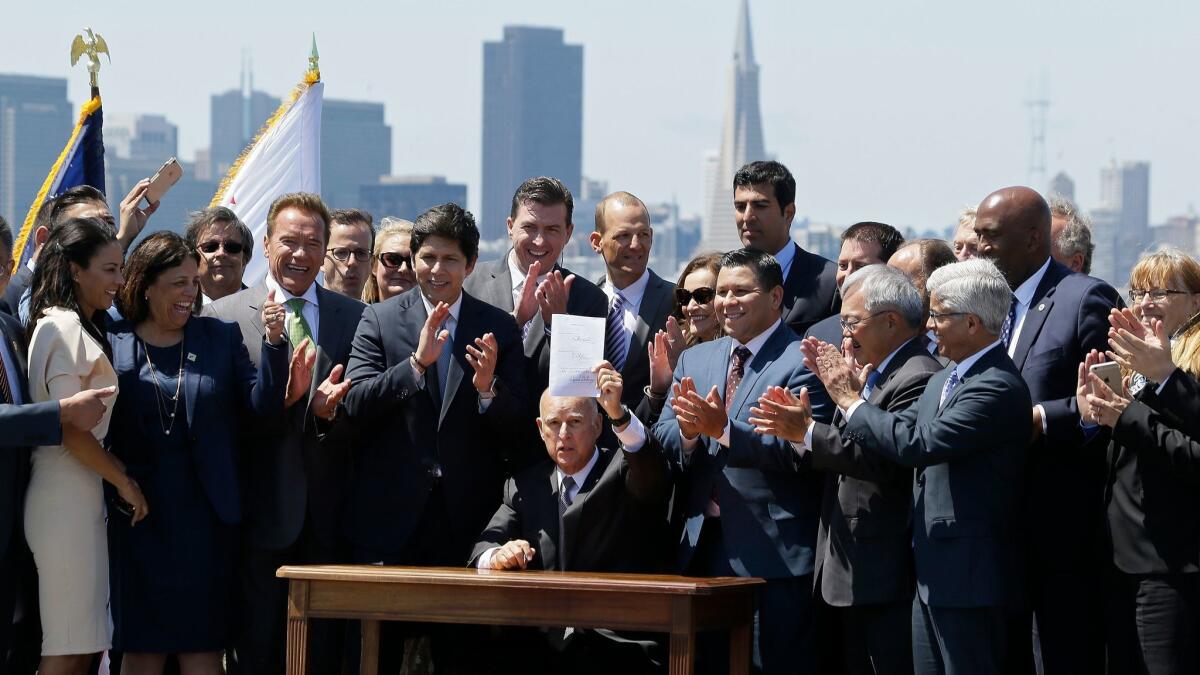Gov. Jerry Brown signs law to extend cap and trade, securing the future of California’s key climate program

Reporting from San Francisco — Cementing California’s role as a leader on climate change, Gov. Jerry Brown signed legislation Tuesday to extend the state’s cap-and-trade program while surrounded by a coalition of supporters including his predecessor, former Gov. Arnold Schwarzenegger.
The program, the only one of its kind in the country and an international model in the fight against global warming, is designed to provide a financial incentive for companies to pollute less. It requires oil refineries, power plants, food processors and other facilities to buy permits to release greenhouse gas emissions into the atmosphere.
“California is leading the world in dealing with the principal existential threat that humanity faces,” Brown said during Tuesday’s ceremony, which took place on Treasure Island with the San Francisco skyline serving as a dramatic backdrop. “What could be a more glorious undertaking?”
Cap and trade was slated to expire in 2020, but the new law extends it until 2030, turning the five-year-old program into a more permanent fixture of California’s environmental agenda. The state will also continue generating billions of dollars by selling emission permits, providing a source of funding for building the bullet train from San Francisco to Los Angeles, another priority for the governor.
By extending cap and trade, California leaders are solidifying their environmental efforts and broadening support for them at a time when President Trump is retreating from the fight against global warming in Washington. The legislation, Assembly Bill 398, was backed by a mix of Democrats, Republicans, environmentalists and businesses, a sharp contrast to the partisan divide that has stalled efforts to reduce greenhouse gases nationally.

A breakdown of the cap and trade program.
Tuesday’s ceremony showcased the growing consensus that cap and trade — and California’s ambitious agenda on climate change — is here to stay.
Brown signed the new legislation at the same spot used by Schwarzenegger in 2006 to sign Assembly Bill 32, which provided the foundation for the cap-and-trade program. The Republican movie star joined Brown on Tuesday, and praised his Democratic successor’s ability to win bipartisan support for the new legislation.
“You had eight Republicans voting for this,” Schwarzenegger said to Brown. “I wish that in 2006 I had eight Republicans. I had one. This is how times have changed.”
In a jab at members of his party still opposed to addressing climate change, Schwarzenegger said, “Stop lying to the people.”
It wasn’t just bipartisan support that showed how times have changed in the last decade. When Assembly Bill 32 was passed, oil companies and other industries were fiercely opposed to it. And when state regulators devised the cap-and-trade program, union workers testified against it.
But this year, they were all part of the coalition supporting cap and trade’s extension. The evolution occurred as California’s economy has continued to grow even as it ratchets down pollution.
The shift accelerated last year when Brown signed legislation to set a new, tougher target for reducing emissions to 40% below 1990 levels by 2030. If cap and trade had been allowed to expire, businesses could have faced even more stringent regulations forcing emission reductions to ensure the state hit its target.
“We’ve got to get to the goal in a way that protects the economy,” said Dorothy Rothrock, president of the California Manufacturers and Technology Assn. “Cap and trade is the most efficient and effective way to do that.”
Brown pushed to extend the program this year despite hesitance from some Democratic lawmakers. A failure could have undermined his efforts to serve as a counterweight to Trump on climate change, but his victory will only boost his international profile before the next United Nations conference in November, where Brown has been named a “special advisor for states and regions.”
Follow live coverage from the Capitol on Essential Politics »
The cap-and-trade legislation, authored by Assemblyman Eduardo Garcia (D-Coachella), was passed with a companion measure, Assembly Bill 617 by Assemblywoman Cristina Garcia (D-Bell Gardens), intended to improve air quality in disadvantaged neighborhoods. Brown is expected to sign it on Wednesday.
Not everyone was satisfied with the final deal. Most Republicans opposed the legislation, and their colleagues who voted for it have faced backlash from conservatives warning about higher costs for gasoline. Meanwhile, some environmental activists opposed the plan as inadequate and too soft on industry.
Brent Newell, legal director at the Center on Race, Poverty and the Environment, said the price of emission permits could remain too low to convince companies to clean up their operations.
“It isn’t an ironclad program to achieve reductions,” he said.
The stakes for California over the next decade are high. The state will be closely watched by supporters and detractors to see if it can maintain a strong economy while deeply slashing emissions.
In addition, no matter how much progress California makes, the United States will fall short of its goals under the Paris accord unless more states take stronger steps on climate change.
So far, that progress has been elusive, and it remains to be seen whether California’s decision to extend cap and trade will inspire similar actions elsewhere. Oregon lawmakers are debating whether to create a program of their own. Northeastern and mid-Atlantic states have a regional cap-and-trade partnership, but it applies only to power plants.
Nevertheless, the state’s leaders signaled that they were determined to move forward, with or without support from the federal government.
“California will lead on climate and clean energy when Washington, D.C., will not,” said Senate leader Kevin de León (D-Los Angeles).
Twitter: @chrismegerian
ALSO
In San Francisco, Al Gore praises Gov. Jerry Brown’s work against climate change
Updates on California politics
More to Read
Get the L.A. Times Politics newsletter
Deeply reported insights into legislation, politics and policy from Sacramento, Washington and beyond. In your inbox three times per week.
You may occasionally receive promotional content from the Los Angeles Times.











